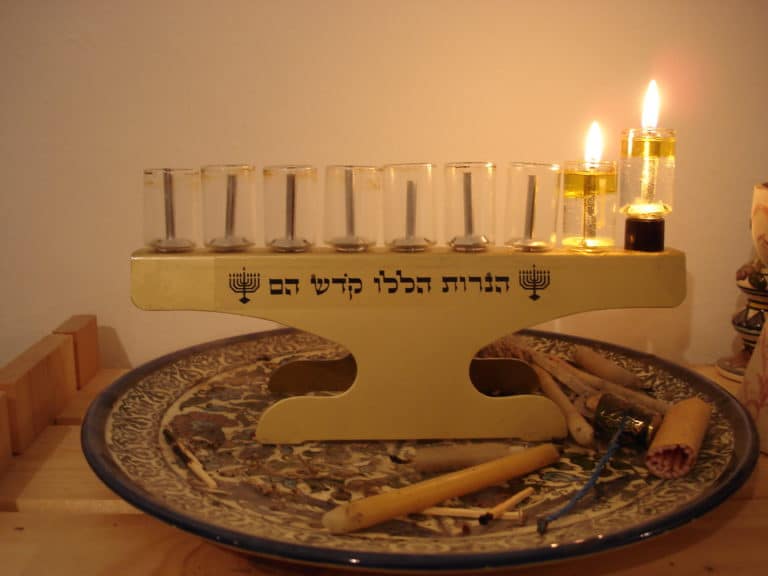
Each day of Hanukkah, our editor Sara Himeles, who recently graduated from rabbinical school, is sharing a teaching and reflection prompt focusing on different themes of the Hanukkah story. Journal your response or simply reflect on each prompt. We hope these teachings and prompts make your Hanukkah brighter and more meaningful.
There is a famous debate in the Talmud (Shabbat 21b) over how to light the Hanukkah candles. While Beit Shammai says to start with all eight candles lit and decrease one candle each night, Beit Hillel says to start with one candle and add another each night until all eight are lit.
בֵּית שַׁמַּאי אוֹמְרִים: יוֹם רִאשׁוֹן מַדְלִיק שְׁמֹנָה, מִכָּאן וְאֵילָךְ פּוֹחֵת וְהוֹלֵךְ. וּבֵית הִלֵּל אוֹמְרִים: יוֹם רִאשׁוֹן מַדְלִיק אַחַת, מִכָּאן וְאֵילָךְ מוֹסִיף וְהוֹלֵךְ
Beit Shammai say: On the first day one kindles eight lights and, from there on, gradually decreases the number of lights until, on the last day of Hanukkah, he kindles one light. And Beit Hillel say: On the first day one kindles one light, and from there on, gradually increases the number of lights until, on the last day, he kindles eight lights.
Beit Hillel ultimately emerged victorious in this debate, and that’s why we follow their model, adding one more candle each night. But we continue to read Beit Shammai’s dissenting opinion and study this debate. Why? What are we meant to learn from this conflict?
There are many interpretations of Hillel and Shammai’s different positions on Hanukkah candles, but one of them is the following. Shammai suggested we start with all eight candles lit to represent the pinnacle of the miracle in the Hanukkah story: the Maccabees’ military victory and rededication of the Temple in 165 B.C.E., and the jar of oil that was enough for only one day, yet burned for a full eight. (If you’re not familiar with the Hanukkah story, check out our Hanukkah guide.)
Each day after, the Jewish people were one day further in time from the Hanukkah story, so we should remove a candle, Shammai said, to show our growing distance from the miracle.
Beit Hillel, on the other hand, had a different view. He believed that we should add candles each night to represent how we all have the ability to add light to our communities and the world. After all, that is exactly what the Maccabees did when they found themselves under the rule of a new king who wanted to destroy Judaism.
When Antiochus IV forced the Jews to assimilate into Hellenist Greek culture and made observing Judaism punishable by death, these Jewish revolutionaries did not look backward at the “glory days” of the past when the Jews had sovereignty and control of the Temple. They did not say, “Those were the good old days! Let’s remember how it was then!”
Instead, they focused on the future and fought back. They decided to revolt against Antiochus and his empire, even though they knew their chances of defeating this superpower were slim to none. In the end, with help from the divine, the Maccabees won, Judaism survived, and Jews regained control of the Temple and the land of Israel.
On Hanukkah, we remember not only the Maccabees’ military victory, but also their choice to fight back. It was their initiative and decision to respond and literally fight for a better future that made victory possible. We add a candle each night to remind us that we must not merely focus on memories of a brighter past. Instead, each one of us can bring light and shape a brighter future for ourselves and our communities.
Prompt:
Rabbi Abraham Isaac Kook said, “The purely righteous do not complain of the dark, but increase the light.”
Similarly, Rabbi Jonathan Sacks wrote, “Hanukkah tells us not to curse the darkness, but instead to bring light to the world.”
On the first night of Hanukkah, think about how you could bring light to your community, your family or to your own life. This could relate to a situation at school, at work or in your family or community. How could you bring light to this situation? This does not need to be a drastic measure: remember, one candle goes a long way to brighten a dark room. What is one act of kindness or one small step you could take?
Originally Published Nov 29, 2021 10:32AM EST


